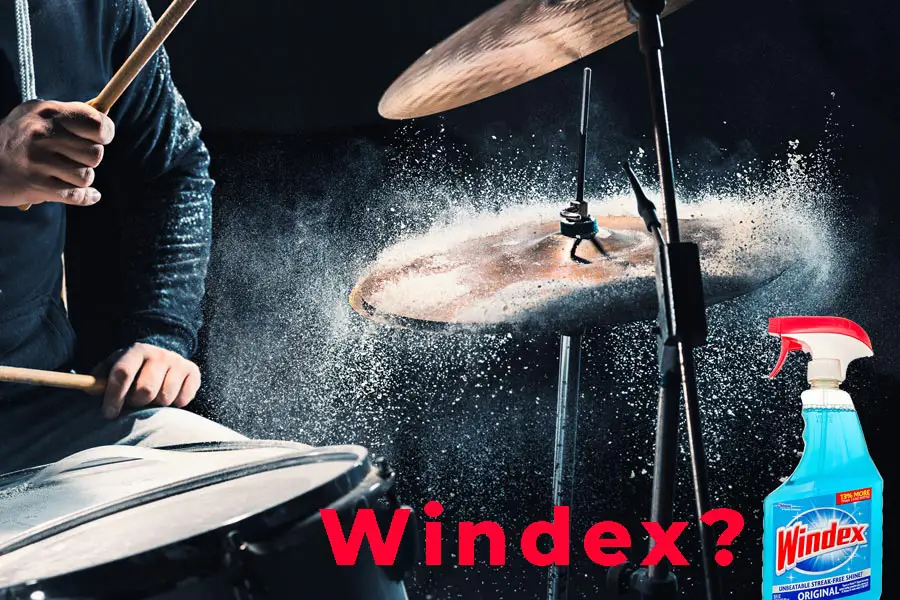We’ve all heard the horror stories before. Guitarists that destroyed their guitars with compressed air and water, Singers that lost a perfectly good microphone to water damage from cleaning routines, and even drummers that destroyed their lacquer finishes or warped their drum skins from silly mistakes.
The truth is that cleaning any instrument is a very particular process and, with an instrument as massive and complex as a drum set, it’s highly important that you know exactly what you should and shouldn’t do to keep your kit in great condition. But, with drum cleaning comes a lot of questions such as what cleaners are safe to use on your kit, which are not, and is a cleaner such as Windex OK to clean your drums with?
Windex and other non-ammonia glass cleaners are by far the safest household cleaners for drum kits. Because of the lack of ammonia, they won’t warp the drum skins or remove the finishes on drum kits whatsoever.
To Windex to your drum kit, spray it directly a lint-free cloth itself and then wipe down the set so as to not leave any wet marks that may warp the wood or attract particles. Do this at least once a month and use a microfiber cloth to remove dust weekly.
You should also never use Windex on your cymbals as this will damage their sound which you can learn more about in our similar article, How to Clean High Hats Without Ruining Them.
For answers to the rest of the postulated questions as well as a better breakdown of the Windex cleaning process, let’s truly assess the validity of various household cleaning and ordinary products for drum kit maintenance and find the best kits for every level of cleanliness below.
Why Windex Works Great for Drum Kit Cleaning
Windex is a non-ammonia based glass cleaner. Because of this, it is not as abrasive as products such as bleach, ajax, comet, or various bathroom and kitchen cleaning sprays. It is also fast-drying and does not stain or leave marks of any kind given that its main function is to leave windows and mirrors smudge-free.
How to Clean Your Drum Kit with Windex
When using Windex on your drums, you will want to split your drum set into a few separate piles as they will need to be handled differently during the cleaning and finishing processes. Start by disassembling your drum set entirely. Put the hardware and stands in one pile, the drums themselves in another, and the cymbals off to the side.
First, begin with your drums themselves by placing them on an old towel or tarp. You can use your Windex for less-aggressive cleans or use a dab of Goo Gone on a cloth for more in-depth maintenance jobs. The key is to never use abrasive cleaning products as they will damage the color, finish, and wood of the drums over time.
Always apply the cleaner to the lint-free cloth itself and clean in a circular motion without adding too much pressure. Once dry, you can use a polishing liquid like Farécla or Howard Feed-N-Wax Wood Polish and apply it with another lint-free cloth sparingly in a circular motion.
For the drum heads, use Windex for clear plastic heads – never applying directly but rather on the cloth. Then, use a small amount of water on a cloth for the coated white heads. You may see some flaking from your coated white heads but this is perfectly normal and good for the drum heads actually.
As for the hardware and stands, use your Windex and a cloth to clean off smudges and dust accordingly. To make them truly look brand now, finish with a metal polish such as Simichrome Polish or Simple Green Stainless Steel and Metal Polish. Don’t use Brasso as this is a more corrosive and harsher polish that can damage drum rims and hardware. The Simple Green is a great option as it is eco-friendly and has no harsh chemicals whatsoever.
Lastly, for cymbal cleaning specifically, you should only use a microfiber cloth, a small amount of water from time to time, or a light acidic product such as apple cider vinegar. However, some drummers will argue that cleaning your cymbals at all is unnecessary and dangerous (we disagree).
Which Cleaners are Safe and NOT Safe to use on my Drum kit?
With a better understanding of exactly how to clean your drums, you may be wondering what products are do’s and don’ts in the drum cleaning process. The answer is actually rather simple but it all depends on the part of the drums you are hoping to clean.
For the drums themselves, non-ammonia cleaners like Windex, 409, Pine Sol, or even a 50/50 blend of water and vinegar are best. You should never use a cleaning supply such as Ajax, Comet, Bleach, or corrosive greases and polishes. This will damage the integrity of your drums and drum heads significantly.
When it comes to your cymbals, there are various cymbal cleaners on the market but you can simply use water and a lint-free cloth as it doesn’t affect the sound of your cymbals whatsoever. You should absolutely never use corrosive greases, ammonia products, or large amounts of water as these products will damage and potentially warp your cymbals over time.
Lastly, for your stands and hardware, a simple non-ammonia cleaner followed by a non-corrosive metal polish is your best solution. Never use a product such as Brasso and steer clear of products that are known to rust metal or damage its integrity and shiny appearance.
All in all, your best is a product such as Windex and your worst bet is anything bleach-related.
What are Some Strange Cleaning Tips and Supplies for Drum Sets?
Although we’ve all likely heard of Windex or Brasso for drum kit cleanings, we’re positive you haven’t heard of some of these unique solutions for everything from cymbals to the chrome hardware.
For starters, let’s begin with the two weirdest cleaning solutions for cymbals. According to Drum Forum, ketchup serves as a low-acidity cymbal cleaner perfect for cleaning smudges and surface grime without tampering with the toned-down sound that comes from a used cymbal. The same is said about apple cider vinegar. In fact, according to DrummerWorld, “Apple cider vinegar works great, no effort, and not abrasive. Any mild acidic food stuff is good such as ketchup, lemon juice, apple cider vinegar, etc. Simply clean off the surface film with dish soap and hot water, then go over with apple cider vinegar, then wash again with soap to neutralize the acid that might be left in the tiny grooves.”
Another unique cleaning method is using coke and aluminum foil to remove light rust and surface grit on drum hoops, lugs, mounting brackets, and cymbal stands. To use this method, simply apply some coke to the metal hardware and stands, crumple up a piece of aluminum foil, scrub the metal with the foil lightly until the rust or grit is gone, and then wash it all off with water and a microfiber cloth.
Although there are countless more that you can find all over drummer’s forums and internet cleaning hacks lists, these are the most common and most effective ones as they actually work and don’t damage your kit or its sound whatsoever.
In Conclusion
In the end, Windex may very well be the perfect cleaning supply for most drum kits and the cleaning process for drummers is truly not as hard as it may seem. All it takes is a bit of cleaning know-how, a desire to keep your drumset as long as possible, and the right materials to make it all happen.
We mentioned a lot of clean supplies in this article so we’ll list them below for your convenience. We included some other drum articles below too. Happy playing!



